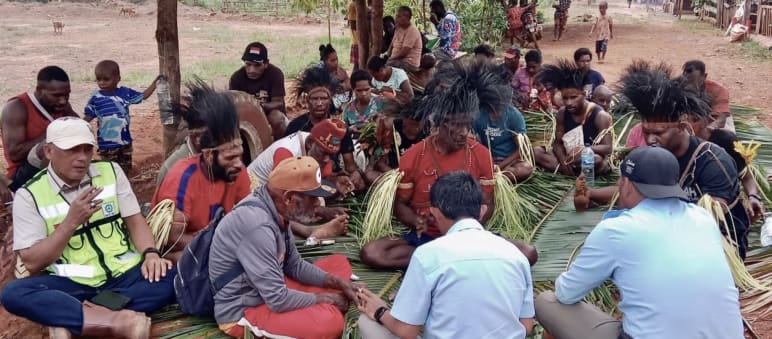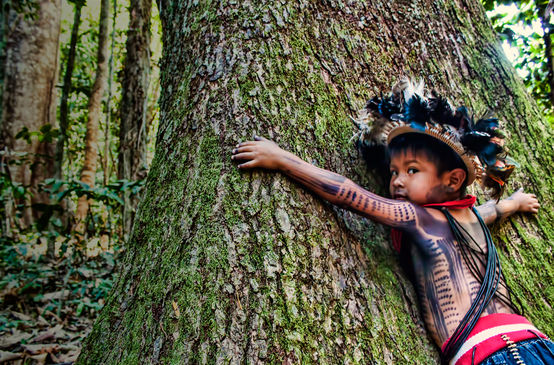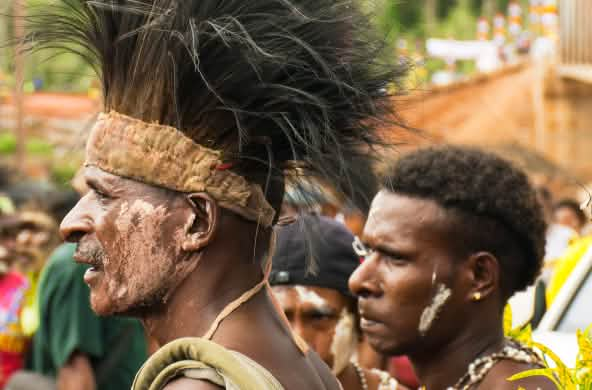
Indonesia: Korindo before Indigenous tribunal in Papua
The Marind Indigenous people of Indonesia’s Merauke district have condemned Korindo, a logging and palm oil company, under their traditional law. But who has the power in the land of the Papuans?
Jungle plants and palm leaves decorate a colorful cross at the entrance to the Korindo Group’s palm oil company, PT Dongin Prabhawa. A group of Papuans from the Marind people have gathered for a tribunal. The charges read: Destruction of the forest and establishment of a plantation in Tabul Epe, on the Digoel River in southern Papua, Indonesia. The cross marks Marind territory and, according to Indigenous law, cannot be removed or crossed.
Korindo, an Indonesian-South Korean corporation, has held a concession to log tropical timber for decades. It is hard to imagine a more remote location than the forest from which Korindo obtains its precious timber: on the upper reaches of the Digoel River, near the border with Papua New Guinea. With the palm oil boom, Korindo also entered the palm oil business and has since cleared large areas of forest for plantations in Merauke district, including outside of government-approved areas, according to local research.
In 2016, the local people – indigenous Papuans from the Marind or Malind tribe, who depend on the forest for their livelihoods – declared that they would not allow any plantations in their ancestral forest area. But Korindo’s palm oil company, PT Dongin Prabhawa, ignored the Marind’s rejection and appears to be planting areas outside its concession.
In doing so, the company would be violating not only state law and the international right of Indigenous peoples to free, prior and informed consent (FPIC), but also traditional adat law, which has successfully regulated the protection and use of nature for centuries – reason enough for a tribunal under Indigenous law.
“We Indigenous people have already negotiated with the company four times. Violations of the law must be punished immediately,” said a Marind representative from the Samakakai tribe.
The punishment should be to compensate the loss of the forest and a fine for the removal of the cross. Korindo has not yet responded.
It is not easy for outsiders to understand the significance of a tribunal under traditional Indigenous law (adat). Korindo could ignore the verdict without coming into conflict with the state. But social conflict and irreparable damage to nature are the consequences that can be avoided thanks to adat law.
The business of land and forest in Papua
In recent years, the business of exploiting Papua’s natural resources has exploded. Fifteen years ago there were a handful of small oil palm plantations, but today 2,208,004 hectares of rainforest have been cleared for palm oil alone.
Environmental groups, church institutions and even some local politicians have scrutinized the companies and found numerous irregularities. They convinced the provincial governments of Papua to audit all oil palm plantations. Based on legal and satellite analysis, numerous violations of the law were identified. Papua’s provincial governments are taking the analysis seriously and are recommending that the Ministry of Forestry revoke the permits of dozens of companies.
Further steps are the responsibility of the Palm Oil Inspection Agency (Satuan Tugas Peningkatan Tata Kelola Industri Kelapa Sawit dan Optimalisasi Penerimaan Negara - Satgas Sawit), which was established in April 2023. Satgas Sawit is under the authority of Minister Luhut Binsar Panjaitan. It has yet to produce any results.
Protests against palm oil companies
Protests against the rapid expansion of oil palm plantations are flaring up across Papua, as the consequences are being felt all too cruelly:
- land grabbing
- disregard for the rights of indigenous peoples
- disregard for workers’ rights
- violence
- clear-cutting of rainforest
- pollution
According to research by our partner organization Pusaka, the following companies are responsible for human rights and environmental violations:
- PT Permata Nusa Mandiri in Lembah Grime Nawa, Jayapura
- PT Indo Asiana Lestari in Kali Mappi, Boven Digoel
- PT Pusaka Agro Lestari in Mimika
- PT Dongin Prabhawa in Mam
- PT Bio Inti Agrindo in Muting, Merauke
- PT Permata Putera Mandiri in Jamarema, South Sorong
- PT Subur Karunia Raya in Bintuni Bay
- PT Inti Kebun Sejahtera in Moisegin, Sorong.
The power of palm oil companies in southern Papua
Most plantations in Papua are owned by large corporations, many of which are foreign-owned or foreign-financed. The top 10 include:
- (1) Korindo Group (since 2021 Tunas Sawa Erma Group), 148,651 hectares
- (2) Indo Gunda (Salim Group) with six companies, 135,177 hectares
- (3) Pacific Interlink Group with three companies, 118,321 hectares
- (4) Capitol Group with three subsidiaries, 97,046 hectares
- (5) Austindo Nusantara Jaya Group with three subsidiaries, 82,468 hectares
- (6) Digoel Agri Group with two subsidiaries, 78,630 hectares
- (7) KPN Group with two subsidiaries, 73,540 hectares
- (8) Indonusa Agromulia Group with three subsidiaries, 62,174 hectares
- (9) Cliandry Anky Abadi Group with three subsidiaries, 53,968 hectares
- (10) Sinar Mas Group with two subsidiaries, 40,678 hectares.
These corporations sell their palm oil worldwide. On its website, Tunas Sawa Erma Group / Korindo Group explains its policy of sustainability, respect for workers’ rights, human rights, Indigenous rights, environmental and climate protection and more. The corporation has the Indonesian ISPO sustainability seal.
Source: Documentation by Pusaka
This page is available in the following languages:

Supporting rainforest defenders
Rainforests are in particularly good shape wherever Indigenous people live and local communities are committed to conservation.

Papua: “Surrendering our land would be suicide”
Tell the Indonesian government to scrap the industrial agriculture projects in Merauke. Protect the forest and the rights of Papua’s indigenous people.

Palm oil
Palm oil is literally everywhere – in our foods, cosmetics, cleaning products and fuels. How could it come to this?